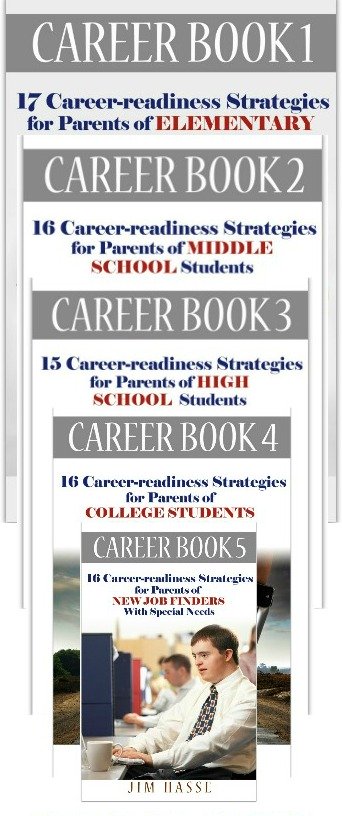Manage Your
Feelings:
Cerebral Palsy
Career Builder for Elementary Students
By Jim Hasse, ABC, GCDF, Disability Employment Expert
_________________________________________________________
Learning how to manage your feelings about yourself is the key to self-esteem, the point at which you say to yourself, “I can do it” and “I’m worthy of happiness.”
Dr. Carolyn Myss says self-esteem isn't something your youngster is born with; the ability to "manage your feelings" is something he or she acquires through nurturing people such as yourself -- through your youngster’s environment and experiences in life.
That’s good news because it shows how important your role as parent, mentor or coach is in shaping that supportive environment for your youngster, especially in the elementary grades.
According to Nathaniel Branden, author of “The Six Pillars of Self-esteem” (Batam Books, 1994), self-esteem has two interrelated components.
One is the sense of basic confidence in the face of life's challenges (dealing effectively with cerebral palsy, for instance). The other is a sense of being worthy of happiness (possessing self-respect).
For your youngster at the elementary level, both components of self-esteem can perhaps be best understood as the ability to "manage your feelings."
Branden summarizes his six pillars of self-esteem like this:
- Living
consciously: being aware of what you’re doing while you’re doing it.
- Self-acceptance:
owning the truths regarding your thoughts, emotions, and behaviors; being
kind toward yourself with respect to them; and being “for” yourself in a
basic sense.
- Self-responsibility:
owning your actions and owning your capacity to be the cause of the effects
you desire.
- Self-assertiveness:
treating your needs and interests with respect and expressing them in
appropriate ways.
- Living
purposefully: formulating goals and establishing and implementing
action plans to achieve them.
- Personal integrity: maintaining alignment between your behaviors and convictions.
That may seem heavy, but Branden is basically saying environment can influence self-esteem, but self-esteem also relies upon how your youngster reacts internally to that environment.
Branden points out that those who have learned how to "manage your feelings" (having a level of self-respect) will have the capacity to respect others. Individuals with healthy senses of self-esteem, he says, do not seek to prove their worth by trying to make others appear to be wrong. They are not belligerent.
But, youngsters (and people of all ages) with poor self-esteem often belittle themselves or their own comments when communicating with others. They'll say things such as, “I think…” or “I feel…” but then apologize for expressing a new idea or concept.
Or, they'll make self-deprecating remarks about themselves, such as, “Oh, I'm so stupid…” at doing something or when they make a mistake.
They'll put themselves down. They'll laugh at inappropriate times. They'll make statements into questions by raising their tone of voice at the end of a sentence.Those with a disability may also play “the victim” and look
for and subsequently find offense almost everywhere when there is none
intended. In that sense, they are not in control of how they feel about themselves. They have not learned how to "manage your feelings."

How you can provide an empowering environment
You can empower your youngster by providing a home life (or frequent place to visit, if your situation is not home-based) which is, in itself, a career builder. It’s a career builder because it fosters self-esteem development -- a place where managing your personal feelings is the norm.
In such an environment, individuals relate to one another at
a high level of consciousness, self-acceptance (and acceptance of others), self-responsibility,
self-assertiveness (and respect for the
assertiveness of others), purposefulness, and personal integrity.
What
family routine has helped foster
self-esteem in your youngster
with unexpected challenges?
Join PACER’s Facebook
discussion.
That type of gathering place offers your youngster an
opportunity to develop, even at an early age, a healthy sense of self-esteem.
To do so, however, such an environment needs to offer your youngster an
opportunity to:
- Feel safe, secure in the knowing that
he or she will not be ridiculed, demeaned, humiliated or punished for
openness and honesty or admitting, " I made a mistake…" or “I
feel down right now…”
- Feel accepted and treated with
courtesy; that means being listened to, invited to express thoughts and
feelings, and being dealt with as an individual whose dignity is important.
- Feel challenge by learning new
things which excite, inspire, test and stretch both ability and
imagination.
- Feel recognized, acknowledged for personal
talents and achievements which are based on reality instead of
paternalism.
- Receive constructive, unfettered feedback
as a means for improving performance in non-demeaning ways that stress
positives instead of negatives and that concentrate on building up
personal strengths.
- See that innovation can be exciting,
and, as a result, personal opinions are solicited and valued.
- Gain easy access to information and
resources about careers and about what makes work valuable and personally
rewarding both from an abstract and general standpoint as well from the
perspective of family members and friends.
- Gain appropriate authority to take
initiative, make decisions, and exercise judgment in school matters which
involve career development and vocational training.
- Live under clear-cut and non-contradictory
rules and guidelines which provide a structure so he or she knows what
the family expects from its each of its members on a day-to-day basis.
- Feel empowered to solve as many
problems as possible on a personal basis instead of passing responsibility
for solutions to other family members.
- See the rewards for success are
far greater than any downside for failure so that appropriate risk taking
becomes a family norm.
- Learn and be rewarded for learning
that expands knowledge and skills.
- Experience congruence between values
and actions within the family, so, as integrity is exemplified by each
member, there is a motivation to match what all family members see in each
other.
- Experience being treated fairly
and justly so that the family becomes a rational, trustworthy unit for
everyone involved.
- Perceive that personal work done within the family is genuinely useful and worth doing.
Within that type of family unit, Branden says, your elementary-school youngster will learn how to manage his or her feelings in appropriate ways and, in the process, realize a higher sense of self-esteem in terms of effectiveness (“I can do it”) and self-respect (“I’m worthy of happiness”).
For youngsters with CP, that growth in
self-esteem is a career builder which is often a critical factor in how
effective they are in developing a meaningful career and an independent,
fulfilling life.
What
family routine has helped foster
self-esteem in your youngster
with unexpected challenges?
Join PACER’s Facebook
discussion.
Return from Manage your Feelings to Job Titles.
Go to Cerebral Palsy Career Builders
This is Creative Commons content. You can freely and legally use, share and repurpose it for non-commercial purposes only, provided you attach this sentence and the following attribution to it (including the two links):
Originally written and illustrated by Jim Hasse, ABC, GCDF, owner of Hasse Communication Counseling, LLC, who, as a person with cerebral palsy, served for 10 years as a vice president in a Fortune 500 company during his 29-year career in corporate communication. He’s an Accredited Business Communicator, certified as a Global Career Development Facilitator and author of 14 Amazon books about disability awareness and disability employment issues.





